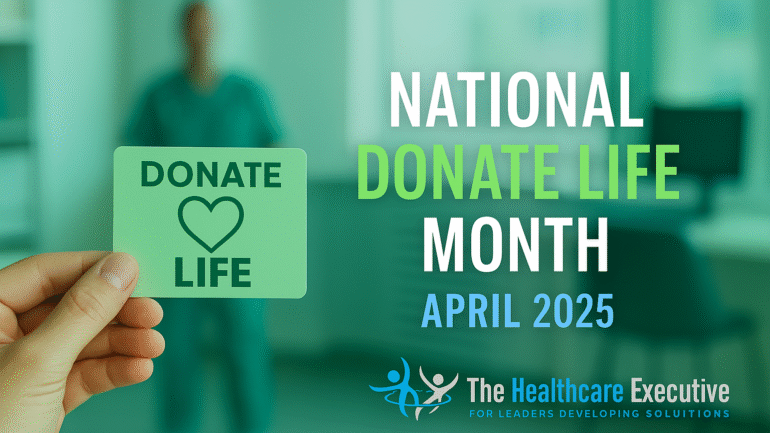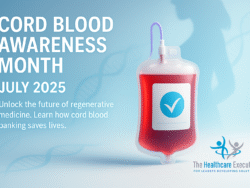National Donate Life Month – April 2025

- Posted by Greg Wahlstrom, MBA, HCM
- Posted in Health Observance Calendar
Leadership in Organ Donation, Access, and Transplant Equity
Published: April 7, 2025
April is recognized as National Donate Life Month, a time to honor the lifesaving gift of organ, eye, and tissue donation. While more than 100,000 people in the United States await a transplant, racial, geographic, and socioeconomic disparities persist throughout the donation process. Hospital leaders are uniquely positioned to address these challenges through data-driven strategy, public education, and culturally competent outreach. Systems like UCHealth in Colorado integrate transplant equity into clinical performance reviews and community health initiatives. Executive support for donation is not symbolic—it is operational. Organ donation equity must be written into the policies, partnerships, and workflows that guide hospital systems daily.
Many hospitals still lack real-time systems to identify potential donors or to coordinate with local organ procurement organizations (OPOs). The result is lost opportunities—and lives. Executive teams must ensure that electronic health records are optimized for donor alerts, and that clinical staff receive ongoing training in ethical, compassionate communication. At NewYork-Presbyterian, transplant readiness is a system-wide focus, with protocols to ensure rapid response and family support. In our article Trust as a Strategic Asset, we explore how transparency, consistency, and trust shape clinical outcomes. Organ donation cannot succeed in fragmented systems—leaders must close the gap between possibility and execution.
Cultural and historical barriers must also be addressed with authenticity and care. Mistrust in the medical system can limit donor registration, particularly among Black, Hispanic, and Indigenous communities. Executive leaders must partner with trusted messengers—including faith leaders, community advocates, and patient navigators—to ensure that donation campaigns reflect the values of the populations they serve. The work of organizations like Donate Life America provides a model for inclusive education. At The Healthcare Executive, we believe that donation readiness is a reflection of how well systems listen to, respect, and uplift the voices of diverse communities. Hospital leadership must ensure that donation is never framed as charity—it is an expression of health equity.
Digital transformation is reshaping organ donation logistics, but executive oversight remains essential. Predictive analytics, real-time donor identification tools, and telehealth transplant assessments are reducing delays and widening access. However, these tools must be governed to ensure privacy, fairness, and continuity. In our article AI in the C-Suite, we explore how technology must be led by clinical insight and community values. Hospital CEOs must drive governance structures that center ethics while optimizing efficiency. Digitizing donation must never outpace the humanity that defines it.
National Donate Life Month 2025 is more than an observance—it is an opportunity for leadership. Executives can launch registration drives, host multidisciplinary learning sessions, strengthen ties with OPOs, and reframe organ donation as a strategic imperative. Toolkits from organdonor.gov and UNOS offer clear pathways to strengthen institutional readiness. At The Healthcare Executive, we encourage leaders to ensure that donation is embedded in operations, not just celebrated in April. Organ donation is not an annual theme—it is a permanent measure of how deeply we lead.
Discover More:
For executives seeking to strengthen public trust, clinical transparency, and equity in high-stakes healthcare decisions, we recommend this leadership resource.
Internal Links
- Trust as a Strategic Asset: Reputation, Outcomes, and the Patient Voice
- AI in the C-Suite: Redefining Decision-Making for Healthcare Executives



